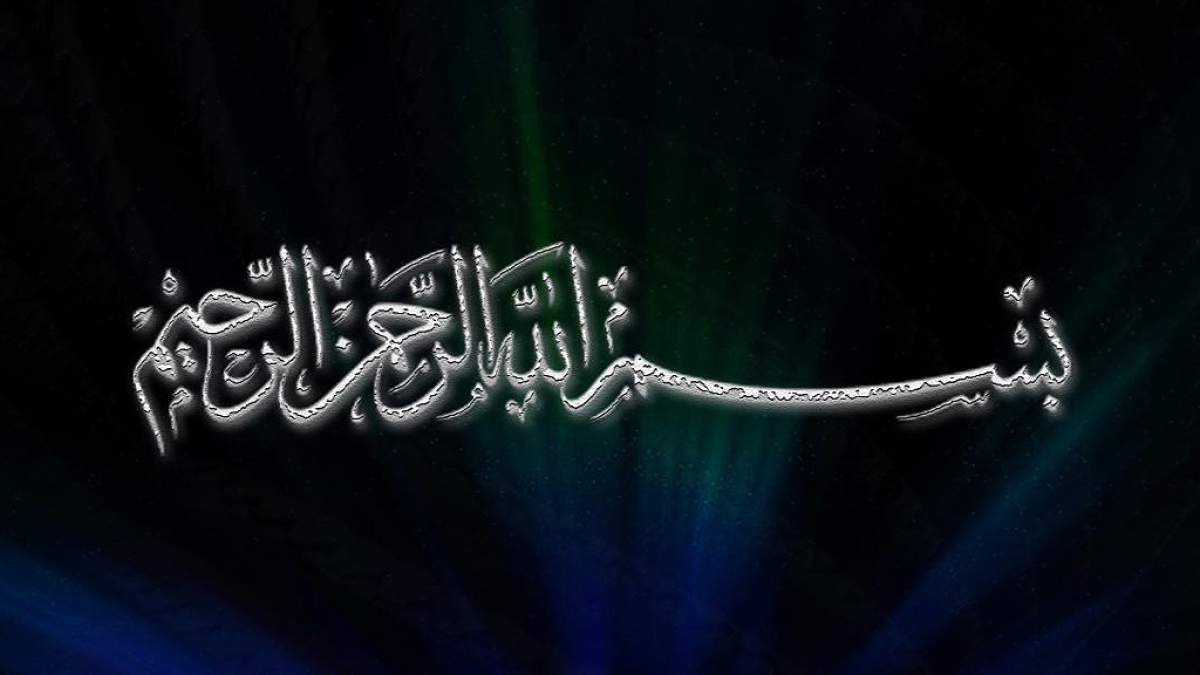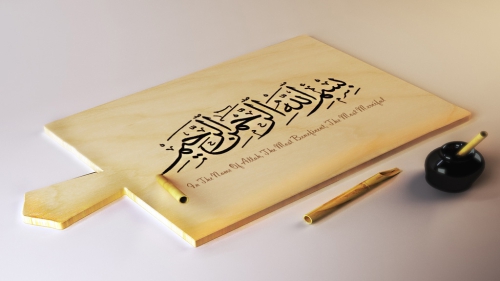Significance of Bismillah

After attestation to faith (shahadah), the most cardinal and often-repeated phrase that Muslims use is bismillahir- rahmanir-rahim. The invocation (basmalah) has from the beginning occupied an important and special place in Muslim piety and practice.
Purpose of the basmalah
Of the many good practices instituted by Islam is that a person should begin all their activities in the Name of Allah . Remembering Allah
before starting any act is an admission on the part of the individual that everything is the creation of Allah
and that whatever activity or skill is to be exercised, has been granted by Allah
; thus developing a degree of proprietal consciousness and a sense of gratitude to the Creator. If the basmalah is thus consciously applied it could restrain wrongful conduct; since one in his right mind would not pronounce the Name of Allah
and then commit evil, in-decency or wrongful acts. In this way, illegitimate activity would be avoided, thus ensuring that the initiation of deeds and the doer's mental orientation are good. In addition to that, when a person reads the basmalah, the Name of Allah
is invoked and due to Allah's nobility, perfection, grandeur and sanctity, the activity which follows is Divinely blessed, protected from evil and thus sanctified.
Place of the basmalah
Scholars are agreed on the following:
- The Basmalah is a verse of the Quran
- It is a part of a verse of Surah Naml (Quran 27:30)
- It is not part of the ninth chapter (Surah Taubah)
- It is part of Surah al-Fatihah according to all seven Imams of Qira'ah
(i.e. Imams 'Asim, Kisa'i, Nafi', Abu 'Amru, Ibn 'Amir, Ibn Kathir and Hamzah) and according to the madhahib (schools of jurisprudence) of Shafi'i, Zaydi, Zahiri, 'Ibadi and Ja'fari. The Hanafi, Maliki and Hanbali schools differ with this view.
Importance of basmalah
The Quran documents its first revelation as: Read! In the Name of thy Rabb (Lord) Who Created (Quran 96:1). In the Old Testament (Deuteronomy, 18:18), we read: "I will raise them (the Semites) a Prophet from among their brethren, like unto thee (Moses) and I will put my words in his mouth, and he shall speak unto them all that I shall command him. And it shall come to pass that whosoever will not hearken unto my words which he shall speak in My Name, and I will require it from him."
As the Holy Prophet of Islam was raised in the likeness of Moses (Quran 73:16), so in fulfillment of the above prophecy, Allah
so ordained that each time a new surah was revealed, it was begun by the words: In the Name of Allah, the Beneficent, Most Merciful.
The Holy Prophet Muhammad is reported to have said: "Any action of importance not begun with basmalah is devoid of blessing and therefore incomplete." The basmalah begins the Surah al-Fatihah and therefore opens the whole Quran.
The Almighty describes Himself by means of His Attributes. The Attributes of Allah are a means of us becoming knowledgeable about Him. Allah
, in this respect, does not only introduce the Quran but He also introduces Himself. The basmalah is an invocation of the Divine Being by His supreme Name (Allah
), followed by two of His most beautiful names (Al-Rahman and Al-Rahim), which are in fact two of His principal Divine attributes. This headline, introduction or foreword called the basmalah, encapsulates in one brief sentence the Creator's relation to creation - the relation of love, care, concern, sympathy, compassion and mercy.
Bismillah literally means "In the Name of Allah", "By the Name of Allah", "via the Assistance and Blessing of the One called Allah."
The three parts to this phrase are B, Ism, and Allah.
"B" could mean "in", "by", or "through".
"Ism" means name. Names are given to objects in order to provide them with a sign by which they may be recognized and distinguished from other things. When the word "Ism" is used in relation to the Creator, it implies an inherent Divine Attribute. According to the Quran (59:24; 17:110), unto Allah belongs the most Beautiful Names. (Asma-ul-Husna) and according to Prophetic Tradition, Allah has 99 Names. These Attributes and Names are of a paramount importance since we know the Divine Being through them. It must be noted that no Name or Attribute of the Almighty is in contradistinction to another of His attributes or Names. He is Compassionate with all of His being, Merciful with all of His being; thus the essence of His many preferred attributes are not separate from one another. All His Names and attributes participate in all degree of His being through the unicity of His Essence. His Holy Names represent reflections of the reality of His Sacred Essence.
"Allah"- This word is a proper noun par excellence. Neither diminutive nor plural can be formed from it. It denotes all attributes of perfection in their infinitude, and refers to none other than the Absolute One, the Unique, Self- subsisting and Supreme Being. The word "Allah" is thus the most comprehensive Name of the Divine Being.
Both the words Rahman and Rahim are derived from the root RHM, which signifies tenderness, care, consideration, affection - requiring the exercise of beneficence, goodness, love, compassion, benevolence and mercy. Allah says in the Quran, "My Rahma encompasses everything." (Quran 7:155) To indicate the intensity and comprehensiveness of the Mercy of Allah, two intensive forms of the word Rahmah are used side by side and in Surah al- Fatihah it is repeated in the third verse as an independent ayah (Ar- Rahman-ir-Raheem). As a matter of fact, no other attribute of Allah as so often been stressed in the Holy Book (over 300 times) than this Divine attribute of Rahmah.
At the very threshold of one's study of the Sacred Scripture, one is ushered into the awareness of the Creator and made conscious of His Holy Presence and reminded of His boundless grace and limitless Mercy.
The Basmalah introduces the "Opening of the Book" (Al- Fatihah) and thus marks the inauguration of the Final Divine Communique - the Holy Quran.
Source: ICOI
Sadullah Khan is the Director of Islamic Center of Irvine. He has presented lectures on Islamic Civilization at California State University at Dominguez Hills. He is a frequent lecturer for the Academy of Judaic, Christian and Islamic Studies at UCLA (University of California, Los Angeles). He is also an advisor to the Chancellor's Committee on Religion Ethics and Values at UCLA and serves as Director of Muslim Affairs at USC (University of Southern California).
You can watch his lectures on Empowerment and Hadith of the Day at IslamiTV
Related Suggestions







